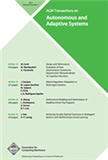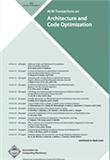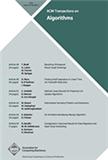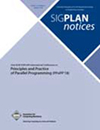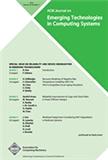Systems Engineering
SCIE
- 雜志名稱:系統(tǒng)工程
- 簡(jiǎn)稱:SYSTEMS ENG
- 期刊ISSN:1098-1241
- 大類研究方向:工程技術(shù)
- 影響因子:0.848
- 數(shù)據(jù)庫(kù)類型:SCIE
- 是否OA:No
- 出版地:UNITED STATES
- 年文章數(shù):30
- 小類研究方向:工程技術(shù)-工程:工業(yè)
- 審稿速度:>12周,或約稿
- 平均錄用比例:容易
官方網(wǎng)站:http://onlinelibrary.wiley.com/journal/10.1002/(ISSN)1520-6858
投稿網(wǎng)址:http://mc.manuscriptcentral.com/SYS
Systems Engineering
英文簡(jiǎn)介Systems engineering is an interdisciplinary field of engineering and engineering management that focuses on how to design and manage complex systems over their life cycles. At its core, systems engineering utilizes systems thinking principles to organize this body of knowledge. The individual outcome of such efforts, an engineered system, can be defined as a combination of components that work in synergy to collectively perform a useful function.Issues such as requirements engineering, reliability, logistics, coordination of different teams, testing and evaluation, maintainability and many other disciplines necessary for successful system development, design, implementation, and ultimate decommission become more difficult when dealing with large or complex projects. Systems engineering deals with work-processes, optimization methods, and risk management tools in such projects. It overlaps technical and human-centered disciplines such as industrial engineering, mechanical engineering, manufacturing engineering, control engineering, software engineering, electrical engineering, cybernetics, organizational studies, civil engineering and project management. Systems engineering ensures that all likely aspects of a project or system are considered, and integrated into a whole.The systems engineering process is a discovery process that is quite unlike a manufacturing process. A manufacturing process is focused on repetitive activities that achieve high quality outputs with minimum cost and time. The systems engineering process must begin by discovering the real problems that need to be resolved, and identifying the most probable or highest impact failures that can occur – systems engineering involves finding solutions to these problems.
Systems Engineering
中文簡(jiǎn)介系統(tǒng)工程是工程和工程管理的一個(gè)跨學(xué)科領(lǐng)域,關(guān)注于如何設(shè)計(jì)和管理復(fù)雜系統(tǒng)的生命周期。系統(tǒng)工程的核心是利用系統(tǒng)思維原則來(lái)組織這一知識(shí)體系。這些工作的單個(gè)結(jié)果,即一個(gè)工程系統(tǒng),可以定義為協(xié)同工作以共同執(zhí)行有用功能的組件的組合。在處理大型或復(fù)雜的項(xiàng)目時(shí),諸如需求工程、可靠性、物流、不同團(tuán)隊(duì)的協(xié)調(diào)、測(cè)試和評(píng)估、可維護(hù)性以及許多其他成功的系統(tǒng)開(kāi)發(fā)、設(shè)計(jì)、實(shí)現(xiàn)和最終退役所必需的規(guī)程等問(wèn)題變得更加困難。系統(tǒng)工程處理此類項(xiàng)目中的工作流程、優(yōu)化方法和風(fēng)險(xiǎn)管理工具。它與工業(yè)工程、機(jī)械工程、制造工程、控制工程、軟件工程、電氣工程、控制論、組織研究、土木工程和項(xiàng)目管理等以技術(shù)和人為中心的學(xué)科交叉。系統(tǒng)工程確保考慮到項(xiàng)目或系統(tǒng)的所有可能方面,并將其集成到一個(gè)整體中。系統(tǒng)工程過(guò)程是一個(gè)發(fā)現(xiàn)過(guò)程,它與制造過(guò)程非常不同。制造過(guò)程的重點(diǎn)是重復(fù)的活動(dòng),以最低的成本和時(shí)間實(shí)現(xiàn)高質(zhì)量的輸出。系統(tǒng)工程過(guò)程必須從發(fā)現(xiàn)需要解決的真正問(wèn)題開(kāi)始,并確定可能發(fā)生的最可能的或影響最大的故障——系統(tǒng)工程包括找到這些問(wèn)題的解決方案。
Systems Engineering
中科院分區(qū)| 大類學(xué)科 | 分區(qū) | 小類學(xué)科 | 分區(qū) | Top期刊 | 綜述期刊 |
| 工程技術(shù) | 4區(qū) | ENGINEERING, INDUSTRIAL 工程:工業(yè) OPERATIONS RESEARCH & MANAGEMENT SCIENCE 運(yùn)籌學(xué)與管理科學(xué) | 4區(qū) 4區(qū) | 否 | 否 |
Systems Engineering
JCR分區(qū)| JCR分區(qū)等級(jí) | JCR所屬學(xué)科 | 分區(qū) | 影響因子 |
| Q3 | OPERATIONS RESEARCH & MANAGEMENT SCIENCE | Q3 | 2.034 |
| ENGINEERING, INDUSTRIAL | Q4 |
Systems Engineering
中科院JCR分區(qū)歷年趨勢(shì)圖Systems Engineering
影響因子精選同類領(lǐng)域期刊,熱門推薦輕松get~
-
- ACM Transactions on Autonomous and Adaptive Systems
- 期刊ISSN:1556-4665
- 大類研究方向:工程技術(shù)
- 影響因子:
- 數(shù)據(jù)庫(kù)類型:SCIE
- 咨詢投稿
-
- ACM Transactions on Architecture and Code Optimization
- 期刊ISSN:1544-3566
- 大類研究方向:工程技術(shù)
- 影響因子:1.444
- 數(shù)據(jù)庫(kù)類型:SCIE
- 咨詢投稿
-
- ACM Transactions on Applied Perception
- 期刊ISSN:1544-3558
- 大類研究方向:工程技術(shù)
- 影響因子:
- 數(shù)據(jù)庫(kù)類型:SCIE
- 咨詢投稿
-
- ACM Transactions on Algorithms
- 期刊ISSN:1549-6325
- 大類研究方向:工程技術(shù)
- 影響因子:
- 數(shù)據(jù)庫(kù)類型:SCIE
- 咨詢投稿
-
- ACM SIGPLAN NOTICES
- 期刊ISSN:0362-1340
- 大類研究方向:工程技術(shù)
- 影響因子:
- 數(shù)據(jù)庫(kù)類型:無(wú)
- 咨詢投稿
-
- ACM Journal on Emerging Technologies in Computing Systems
- 期刊ISSN:1550-4832
- 大類研究方向:工程技術(shù)
- 影響因子:2.013
- 數(shù)據(jù)庫(kù)類型:SCIE
- 咨詢投稿
精選常見(jiàn)問(wèn)題,答疑解惑輕松get~
- 三篇ssci論文怎么同時(shí)投出去
- 中文核心和sci哪個(gè)影響力更大
- 中科院一區(qū)和JCR一區(qū)期刊占比區(qū)別
- 發(fā)ssci如何快速找合適的期刊
- 資源保護(hù)方面論文投sci指導(dǎo)
- 外貿(mào)行業(yè)論文發(fā)ssci周期長(zhǎng)嗎
- 國(guó)外的sci投到錄用一般多久
- ssci期刊國(guó)內(nèi)認(rèn)可度
- 核能應(yīng)用論文翻譯英文發(fā)sci容易的方法
- 人口老齡化研究論文符合ssci領(lǐng)域嗎
- sci開(kāi)源和不開(kāi)源分別是什么意思?有什么影響?
- ssci發(fā)表是高水平學(xué)術(shù)論文嗎
- 生態(tài)修復(fù)主題英文論文會(huì)收錄哪些數(shù)據(jù)庫(kù)
- 哲學(xué)專業(yè)論文發(fā)英文期刊
- 中科院sci四個(gè)區(qū)的劃分
- ssci期刊和sci期刊的區(qū)別
- ESCI和SCIE要分清
- ssci送審論文多久出結(jié)果
- ssci論文二作有用嗎
- 水土保持類英文期刊好選嗎
- ssci期刊論文一定會(huì)檢索嗎
 投稿咨詢
投稿咨詢

